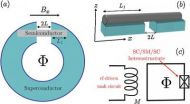(Press-News.org) Scientists at the Montreal Neurological Institute and Hospital – The Neuro, McGill University working with a team at Oxford University have uncovered the genetic defect underlying a group of rare genetic disorders.
Using a new technique that has revolutionized genetic studies, the teams determined that mutations in the RMND1 gene were responsible for severe neurodegenerative disorders, in two infants, ultimately leading to their early death. Although the teams' investigations dealt with an infant, their discovery also has implications for understanding the causes of later-onset neurological diseases.
The RMND1 gene encodes a protein that is an important component of the machinery in mitochondria which generates the chemical energy that all cells need to function. Mutations in genes affecting mitochondrial function are common causes of neurological and neuromuscular disorders in adults and children. It is estimated that one newborn baby out of 5000 is at risk for developing one of these disorders. Mortality among such cases is very high.
"Mitochondria are becoming a focus of research because it's clear they're involved in neurodegenerative disorders in a fairly big way," says Dr. Eric Shoubridge, an internationally recognized specialist on mitochondrial diseases at The Neuro and lead author of the paper published in The American Journal of Human Genetics. "For instance, we're finding that dysfunctional mitochondria may be at the heart of adult-onset disorders like Parkinson's and Alzheimer's disease."
Discovery of the mutations in the RMND1 gene involved using whole-exome sequencing at the McGill University and Genome Québec Innovation Centre. This technique allows all of the genes in the body that code for proteins to be sequenced and analyzed in a single experiment. At a cost of about $1000, whole-exome sequencing is much more economical than previous techniques in which lists of candidate genes had to be screened in the search for mutations. The technique is poised to change the face of genetic diagnosis, making testing more efficient and available.
"Parents who have had a child with a mitochondrial disorder and who are hesitating to have another child now have the possibility to know the cause of the disease. With genetic information, they have reproductive options like in vitro fertilization," says Dr. Shoubridge. The discovery of the RMND1 gene's role sheds light on disorders of mitochondrial energy metabolism, but therapies to alleviate or cure such disorders remain elusive. Dr. Shoubridge is hopeful that the discovery will encourage pharmaceutical interest. "Drug companies are starting to be interested in rare diseases and metabolic disorders like this. They're picking some genes as potential drug candidates."
###
The Neuro
The Neuro is an academic medical centre dedicated to neuroscience. As a research and teaching institute of McGill University, The Neuro is at the centre of the neuroscience mission of the McGill University Health Centre. The eminent neurosurgeon Wilder Penfield founded The Neuro in 1934. Since then, The Neuro has achieved international renown for its integration of research, outstanding patient care and advanced training. The Neuro has a world-class staff in cellular and molecular neuroscience, brain imaging, cognitive neuroscience, as well as in the study and treatment of epilepsy, multiple sclerosis and neuromuscular disorders. For more information, please visit www.theneuro.com.
Scientists discover gene behind rare disorders
International study with researchers at The Neuro reveals links with other neurodegenerative diseases
2012-10-09
ELSE PRESS RELEASES FROM THIS DATE:
Chaperone protein subverts removal of glaucoma-causing protein
2012-10-09
Tampa, FL (Oct. 8, 2012) -- The chaperone protein Grp94 can interfere with the clearance of another protein known to cause the glaucoma when mutated, a new study led by researchers at the University of South Florida has found. Using a cell model, the researchers also demonstrated that a new specific inhibitor of Grp94 facilitates clearance of the genetically-defective protein, called myocilin, from cells.
Reported online this month in JBC (The Journal of Biological Chemistry), the discoveries could lead to a new treatment for some hereditary cases of glaucoma, an eye ...
Topological superconductors
2012-10-09
If quantum computers are ever going to perform all those expected feats of code-breaking and number crunching, then their component qubits---tiny ephemeral quantum cells held in a superposition of internal states---will have to be protected from intervention by the outside world. In other words, decoherence, the loss of the qubits' quantum integrity, has to be postponed. Now theoretical physicists at the Joint Quantum Institute (JQI) and the University of Maryland have done an important step forward to understand qubits in a real-world setup. In a new study they show, ...
Bioenergy - The broken promise
2012-10-09
Biofuels are going to save us from climate threats and the oil crisis, while at the same time providing an opportunity to the smallholder farmers of the world. Hopes are high, but completely unrealistic. It is like trying to push a square peg into a round hole, according to a current thesis at Linköping University.
Bioenergy could replace fossil fuels and solve the looming energy crisis. Into the bargain, we will benefit from reduced greenhouse gas emissions. A further bonus could be that demand for biofuels gives a lift to smallholder farmers in poor countries, who would ...
Doubling up on advanced prostate cancer with PARP inhibitors
2012-10-09
A newly discovered function of PARP-1 could be the key to more effective therapeutics to treat advanced prostate cancer patients, a recent preclinical study published in Cancer Discovery by Jefferson's Kimmel Cancer Center researchers suggests.
The team, led by Karen E. Knudsen, Ph.D., Professor in the Departments of Cancer Biology, Urology, & Radiation Oncology at Thomas Jefferson University, found that functions of PARP-1 not only include DNA damage repair but also androgen receptor (AR) regulation in advanced prostate cancer growth and progression. PARP inhibition ...
Chronic kidney disease alters intestinal microbial flora, UCI study finds
2012-10-09
Irvine, Calif., Oct. 9, 2012 – Chronic kidney disease changes the composition of intestinal bacterial microbes that normally play a crucial role in staving off disease-causing pathogens and maintaining micronutrient balance, according to UC Irvine researchers.
This profound alteration of the gut microbial population may contribute to the production of uremic toxins, systemic and local inflammation, and nutritional abnormalities present in patients with advanced renal disease, they said.
Study leader Dr. N.D. Vaziri of the UCI School of Medicine's Division of Nephrology ...
Drawing a line, with carbon nanotubes
2012-10-09
CAMBRIDGE, Mass. -- Carbon nanotubes offer a powerful new way to detect harmful gases in the environment. However, the methods typically used to build carbon nanotube sensors are hazardous and not suited for large-scale production.
A new fabrication method created by MIT chemists — as simple as drawing a line on a sheet of paper — may overcome that obstacle. MIT postdoc Katherine Mirica has designed a new type of pencil lead in which graphite is replaced with a compressed powder of carbon nanotubes. The lead, which can be used with a regular mechanical pencil, can inscribe ...
Academic achievement improved among students active in structured after-school programs
2012-10-09
School-age children who participate in structured after-school activities improve their academic achievement, according to a new study from Southern Methodist University, Dallas.
The study by researchers in SMU's Simmons School of Education and Human Development measured academic performance of students enrolled in Boys and Girls Clubs of Greater Dallas.
"Boys and Girls Clubs of Greater Dallas and other structured programs are really having a positive impact," said Ken Springer, an associate professor. "We believe that the homework support that the clubs consistently ...
How cancer cells break free from tumors
2012-10-09
CAMBRIDGE, MA -- Although tumor metastasis causes about 90 percent of cancer deaths, the exact mechanism that allows cancer cells to spread from one part of the body to another is not well understood. One key question is how tumor cells detach from the structural elements that normally hold tissues in place, then reattach themselves in a new site.
A new study from MIT cancer researchers reveals some of the cellular adhesion molecules that are critical to this process. The findings, published Oct. 9 in Nature Communications, offer potential new cancer drug targets, says ...
Online attitudes predict individuals' compulsive and excessive Internet use and poor well-being
2012-10-09
Among the most popular questions addressed in online communication research is the extent to which Internet use leads to undesirable psychosocial outcomes such as depression and loneliness. Evidence suggests that certain motivations to communicate online can have negative consequences, as the Internet itself can, for some, serve as an object of compulsive use. Individuals' compulsive Internet use (CIU) refers to their inability to control, reduce, or stop their online behavior, while excessive Internet use (EIU) is the degree to which an individual feels that he or she ...
Preterm labor powerhouse therapy offers promise for inflammatory diseases
2012-10-09
Magnesium sulfate is given to many pregnant women to treat preterm labor and preeclampsia and was recently shown to prevent cerebral palsy; however little is known about how it works. Researchers at Case Western Reserve University School of Medicine recently discovered the mechanism by which magnesium reduces the production of cytokines. Cytokines are molecules responsible for regulating inflammation; they play a key role conditions, such as diabetes, obesity, atherosclerosis, asthma, and alcoholic liver disease and cirrhosis. Although the study related to pregnancy, inflammation ...
LAST 30 PRESS RELEASES:
Scientists show how to predict world’s deadly scorpion hotspots
ASU researchers to lead AAAS panel on water insecurity in the United States
ASU professor Anne Stone to present at AAAS Conference in Phoenix on ancient origins of modern disease
Proposals for exploring viruses and skin as the next experimental quantum frontiers share US$30,000 science award
ASU researchers showcase scalable tech solutions for older adults living alone with cognitive decline at AAAS 2026
Scientists identify smooth regional trends in fruit fly survival strategies
Antipathy toward snakes? Your parents likely talked you into that at an early age
Sylvester Cancer Tip Sheet for Feb. 2026
Online exposure to medical misinformation concentrated among older adults
Telehealth improves access to genetic services for adult survivors of childhood cancers
Outdated mortality benchmarks risk missing early signs of famine and delay recognizing mass starvation
Newly discovered bacterium converts carbon dioxide into chemicals using electricity
Flipping and reversing mini-proteins could improve disease treatment
Scientists reveal major hidden source of atmospheric nitrogen pollution in fragile lake basin
Biochar emerges as a powerful tool for soil carbon neutrality and climate mitigation
Tiny cell messengers show big promise for safer protein and gene delivery
AMS releases statement regarding the decision to rescind EPA’s 2009 Endangerment Finding
Parents’ alcohol and drug use influences their children’s consumption, research shows
Modular assembly of chiral nitrogen-bridged rings achieved by palladium-catalyzed diastereoselective and enantioselective cascade cyclization reactions
Promoting civic engagement
AMS Science Preview: Hurricane slowdown, school snow days
Deforestation in the Amazon raises the surface temperature by 3 °C during the dry season
Model more accurately maps the impact of frost on corn crops
How did humans develop sharp vision? Lab-grown retinas show likely answer
Sour grapes? Taste, experience of sour foods depends on individual consumer
At AAAS, professor Krystal Tsosie argues the future of science must be Indigenous-led
From the lab to the living room: Decoding Parkinson’s patients movements in the real world
Research advances in porous materials, as highlighted in the 2025 Nobel Prize in Chemistry
Sally C. Morton, executive vice president of ASU Knowledge Enterprise, presents a bold and practical framework for moving research from discovery to real-world impact
Biochemical parameters in patients with diabetic nephropathy versus individuals with diabetes alone, non-diabetic nephropathy, and healthy controls
[Press-News.org] Scientists discover gene behind rare disordersInternational study with researchers at The Neuro reveals links with other neurodegenerative diseases

